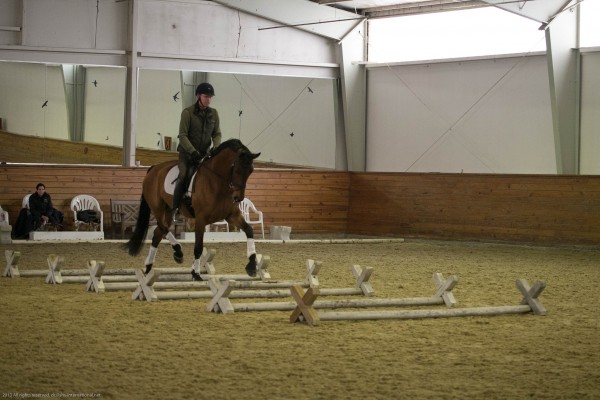In any discipline, reaching a plateau is an inevitable part of the training process. A horse and rider can’t grow in leaps and bounds with every single ride. The plateau can feel like a rut. It can facilitate frustration and boredom. A 20 meter circle can start to feel like monotony, ridden ten million times and with no improvement or end in sight.
But if some view the plateau as a stagnant no man’s land, professional dressage trainer David Collins takes the opposite approach that it’s where the rubber meets the road.
“A lot of people would rather win gold medals than ride into every corner,” he says. “But from beginner through advanced levels, the plateau work is what ultimately moves you up the levels.”
“Working with the plateau is day in and day out honest work,” David explains. “It means making the consistent effort to stay soft, relaxed, use only the muscles needed to get the job done, and ride in good form.”
All of this, as we know, is easier said than done.
In every lesson that he teaches, David reminds his students to love the plateau. Not for the sake of dogma or to encourage negative thinking, but to shift the focus away from goal-driven outcomes and renew the commitment to mindful riding.
The plateau is beautiful in its universality. From the bottom levels all the way up to Grand Prix, the basics in dressage remain the same. Advanced movements are made out of simple training elements stacked one by one on top of each other. If too many simple things become stacked improperly, the results show at the top.
“How do you improve the piaff?” David asks. “Not by drilling it. You improve the connection, suppleness, and relaxation. You get the horse to step through his back. You teach him to engage and use his muscle groups efficiently.”
Training with an objective focus and executing the proper aids is often all it takes to enjoy a ride that feels successful. The rider should also learn to balance low expectations but maintain high standards.
“Thinking too much about what you want to accomplish means you are not thinking enough about what you are doing. You end up with a lot in common with the football player who’s focused on his easy touchdown and instead gets nailed from behind on the two yard line.”
A stressed horse that has too many things being demanded of it will stop progressing after a certain point.
“Any time a horse is in training, there is duality: conflict and harmony,” David points out. “Everybody loves the harmony but gets uptight during the conflict.”
There is always room to make larger efforts to keep your cool and improve your relaxation in the saddle. Doing so goes a long way towards building a better future for you and your horse—especially during the plateau phases. When dressage becomes a moving meditation rather than an exercise in ambition or ego, horses are happier with their work.
“We ride for us, not for the horse,” David says in reminder. “Therefore they need to walk into the arena wanting to do what we ask of them—whatever that might be.”
So, how does David rethink his plateaus?
“Each time I get on, I try to challenge myself. Can I ride my basics a little better? Can I be a little softer? Can I improve my aids? Can I keep my horse happily working?”
While we are talking about the fundamentals of riding, on a larger scale David is implying the importance of humility.
So to all you February riders out there who may be feeling stuck on a wintry dead end road—remember that every time you are around your horse you have the chance to improve something about your relationship. It’s all about the baby steps, the basics, and the attitude that takes you forward.
Then, when it seems like it might never happen, something clicks. In a single instant, it makes sense. After months of practicing and finding new ways to hear the same idea, you suddenly execute a downward transition with flawless balance. Or maybe that pesky distance to the oxer now reads like a book every time.
You experience the harmony of dancing feet and quiet hands. This is euphoria.
Congratulations.
Allow the feeling of victory to wash over you, celebrate the exciting fact that progress has been made, and give your horse a hearty pat. Then get comfortable right where you are—the next plateau awaits, for the best kind of learning should never end.



 July 21, 2016
July 21, 2016 























